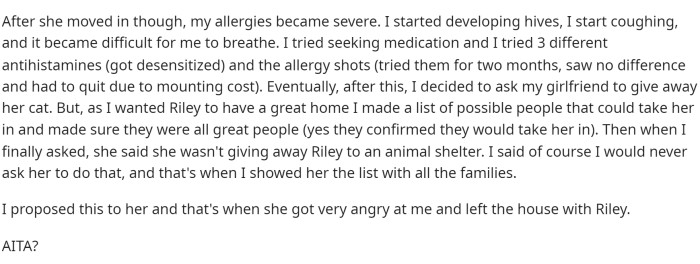Guy Is Allergic To His Girlfriend's Cat So He Asks Her To Get Rid Of It, Even Makes A List Of Potential New Owners
We're here again with another AITA thread post from Reddit where someone is looking for advice on whether or not they are in the wrong for doing or saying something. Today's post made people quite conflicted in the comments, and many had a lot to say.
There are also updates for this story where OP was seeking more advice on the situation after the fact. With that said, let's look into a bit about what this guy is posting for.
OP is allergic to cats, and he made a compromise and knew this when dating her, but his allergies suddenly worsened. This was when he decided to ask her to get rid of her cat.
Now, we can't be mad about this because some people have their deal breakers, and he does have allergies. So he's come to Reddit to see if he's wrong for even suggesting this to her because she became very upset with him.
If this story sounds interesting and you want to hear more about the situation, then stay tuned because we're going to show you the whole post and some of the best comments on it as well.
OP starts off the post stating some information on the background of his girlfriend and him, and their relationship with the cat in question.

He says that his allergies became quite severe after she moved in, and it has become intolerable, which is why he asked her to get rid of the cat.

He then adds in some more details to give context to the situation after reading some comments from people.

Understanding Allergies and Relationship Dynamics
According to research from the American Academy of Allergy, Asthma, and Immunology, allergies can significantly impact interpersonal relationships. When one partner's health is at risk due to allergens, it can create tension and difficult decisions about shared living spaces. This situation often requires careful negotiation and compromise to maintain harmony while also addressing health concerns.
Psychological experts note that these conversations can evoke strong emotions, including guilt, frustration, and resentment, which can complicate the decision-making process.
Navigating Allergies in Relationships
Living with allergies can significantly impact relationship dynamics, as Dr. Brian Smith, an allergist and psychologist at Columbia University, explains.
His research indicates that allergic responses can create tension when partners have different levels of tolerance for pets.
In this case, the boyfriend's allergies may not only affect his health but also create a sense of frustration and helplessness in the relationship.
Navigating Allergies in Relationships
When one partner has a pet allergy, it can create significant stress within a relationship. Dr. Sarah Thompson, a clinical psychologist, points out that navigating such conflicts often requires a balance between personal health needs and emotional attachments. This scenario exemplifies the challenges couples face when their preferences and needs diverge, particularly around shared living spaces.
Research indicates that health-related issues can influence relationship satisfaction, especially when one partner feels their needs are being disregarded. Understanding the emotional implications of such situations is crucial for fostering empathy and collaboration.
He posted a final update for everyone where people can see more information about the situation and what's going on.

Some people in the comments said that OP was TA in the situation and that he shouldn't expect her to get rid of the cat.

This is true too; for OP, the cat is just a cat, but for the GF, she probably thinks of the cat as more important than OP.

Behavioral science suggests that individuals often experience heightened emotional responses when their health is threatened. For instance, a study published in the Journal of Psychosomatic Research found that health concerns can lead to increased anxiety and stress, which can manifest in interpersonal conflicts. It's crucial for both partners to acknowledge these emotions and approach the situation with empathy and understanding.
Recognizing that health and well-being are crucial can foster compassion and cooperation in addressing the issue.
A study published in the Journal of Environmental Psychology found that allergies can lead to feelings of isolation and anxiety, particularly in shared living situations.
This emotional weight can complicate decisions about pets and living arrangements, as partners must navigate both health concerns and emotional attachments.
Addressing these concerns openly can foster a supportive environment where both parties feel heard.
Additionally, maintaining open lines of communication is essential in addressing these sensitive topics. Evidence suggests that couples who engage in honest discussions about health concerns tend to report higher satisfaction levels. By sharing their feelings and concerns, both partners can work towards finding solutions that accommodate each other's needs, fostering a sense of partnership.
Implementing regular check-ins to discuss concerns can also strengthen communication, allowing for adjustments as needed.
He can come up with plans and suggestions, but he kind of set it up perfectly so he expected her to say yes.

This person is advocating for OP after reading some of his updates, but they said creating the list and trying to make the decision for her was the AH move, which we have to agree on.

Again, people are suggesting that her cat means more to her than the boyfriend, and that very well may be the case.

Navigating Compromise in Relationships
Experts suggest utilizing structured communication approaches, such as Nonviolent Communication (NVC), to discuss sensitive topics like allergies. This method encourages expressing feelings and needs without blame, fostering a collaborative atmosphere for finding solutions. By focusing on mutual understanding, couples can work toward compromises that prioritize both health and the relationship.
Studies show that couples who utilize NVC report higher satisfaction in their interactions, highlighting its effectiveness in resolving conflict.
The Importance of Compromise in Relationships
Relationships often require compromise, especially when it comes to health and emotional well-being.
According to Dr. John Gottman's research, successful partnerships involve mutual respect and open communication about needs and boundaries.
In this scenario, finding a solution that respects both the boyfriend's health needs and the girlfriend's emotional attachment to her cat is essential for maintaining harmony.
Compromise and Its Importance
Compromise plays a vital role in maintaining harmony in relationships, especially when significant issues arise. Research in conflict resolution emphasizes that finding middle ground can help both partners feel valued and understood. In this case, exploring alternatives, such as creating designated pet-free areas or considering pet rehoming, can demonstrate a willingness to prioritize each other's needs.
Being open to compromise not only helps address immediate concerns but also strengthens the bond between partners by showcasing their commitment to the relationship.
It's hard to tell how invested people are in their pets, and if he doesn't view the cat the same way she does, then he doesn't understand.

He should really prepare himself for either decision, honestly, because he doesn't know what she will say.

Well, this was an interesting story. We feel bad for OP, of course, but he should have approached the situation differently.
He should focus more on the allergy aspect or maybe just tell the girlfriend that either he will have to move out or she will have to, because it's becoming too much.
Practically, it may be beneficial for couples to create a list of potential solutions together, allowing both partners to contribute to the conversation. This collaborative approach not only fosters teamwork but also ensures that both voices are heard in the decision-making process. Additionally, seeking the input of a professional mediator can provide valuable insights and facilitate a more productive discussion.
Understanding Emotional Triggers
Emotional triggers often play a significant role in relationship conflicts. Research suggests that unresolved emotional issues can lead to heightened sensitivities, making it essential for partners to recognize and address these triggers. Understanding each other's emotional landscapes can foster empathy and reduce defensiveness during discussions about sensitive topics.
This awareness can help partners navigate conflicts more effectively, allowing for a more compassionate approach that acknowledges each person's feelings and needs.
Encouraging self-reflection can also be beneficial in these situations. Journaling or discussing feelings with a trusted friend can help individuals process their emotions, leading to greater clarity and understanding of their reactions. This practice can enhance emotional regulation, enabling partners to approach conflicts with a more balanced perspective.
Psychological Analysis
This scenario illustrates the complexities that arise when health issues intersect with emotional attachments. Our observations suggest that fostering open communication about health concerns can significantly improve relationship dynamics. Encouraging both partners to express their feelings can lead to more collaborative and understanding solutions.
Analysis generated by AI
Analysis & Alternative Approaches
In summary, navigating allergies in relationships requires empathy, open communication, and a willingness to compromise. By recognizing the psychological dynamics at play, couples can work towards solutions that accommodate both partners' needs. Research supports the idea that effective dialogue and collaboration are essential for fostering a harmonious living environment.
One potential solution could involve exploring pet-friendly options that accommodate the boyfriend's allergies.
Research suggests that gradual exposure to allergens, under controlled circumstances, can sometimes help individuals adjust to their environments.
Discussing these possibilities together could empower both partners to find a middle ground that respects their needs.
Emotional Resilience in Relationships
Building emotional resilience is crucial when navigating health-related conflicts in relationships.
Dr. Brené Brown emphasizes that vulnerability can lead to deeper connections, especially when partners openly share their fears and concerns.
In this situation, fostering an environment of vulnerability can help the couple navigate their feelings about the cat and allergies more effectively.
Ultimately, addressing allergies in a relationship requires sensitivity and understanding.
Research indicates that acknowledging each other's emotional responses can deepen emotional intimacy and facilitate compromise.
Encouraging open conversations about both health concerns and feelings toward the pet can lead to a more harmonious living situation.
Practical Strategies for Managing Allergies
Implementing practical strategies to manage allergies can significantly improve living conditions.
Research suggests that creating pet-free zones and maintaining a clean environment can reduce allergen exposure.
By discussing these strategies, the couple can work together to find solutions that prioritize both health and emotional well-being.
Ultimately, navigating allergies in relationships is about balancing health needs with emotional attachments.
Psychologists emphasize the importance of empathy and understanding in fostering a supportive environment.
By prioritizing open communication, couples can build stronger connections while addressing health-related challenges.
Psychological Analysis
This scenario illustrates the delicate balance between health concerns and emotional attachments in relationships.
Recognizing and addressing these needs is essential for creating a supportive and understanding partnership.
Analysis generated by AI
Analysis & Alternative Approaches
Allergies can create significant emotional and relational challenges in partnerships.
As noted in various psychological studies, effective communication and compromise are crucial for maintaining harmony.
By fostering understanding and empathy, couples can navigate these complexities and build stronger relationships.
In some cases, seeking professional guidance, such as couples therapy, may provide additional support in navigating these challenges. Research indicates that therapy can help couples develop effective coping strategies and improve communication skills, leading to healthier dynamics. By prioritizing each partner's needs, couples can create environments that support both health and relationship satisfaction.
Ultimately, open dialogue and mutual respect are essential in navigating these types of conflicts.
Psychological Analysis
This situation illustrates a classic conflict between individual health needs and relational harmony. The challenge lies in balancing these two priorities, which can be emotionally charged. Open communication about these needs is essential, as both partners must feel heard and respected to find a mutually agreeable solution.
Analysis generated by AI
Analysis & Alternative Approaches
Addressing health-related issues in relationships requires careful navigation and understanding. By utilizing effective communication techniques and seeking professional guidance when needed, couples can create supportive environments. Research highlights that prioritizing both partners' needs leads to healthier relationships and improved satisfaction.



